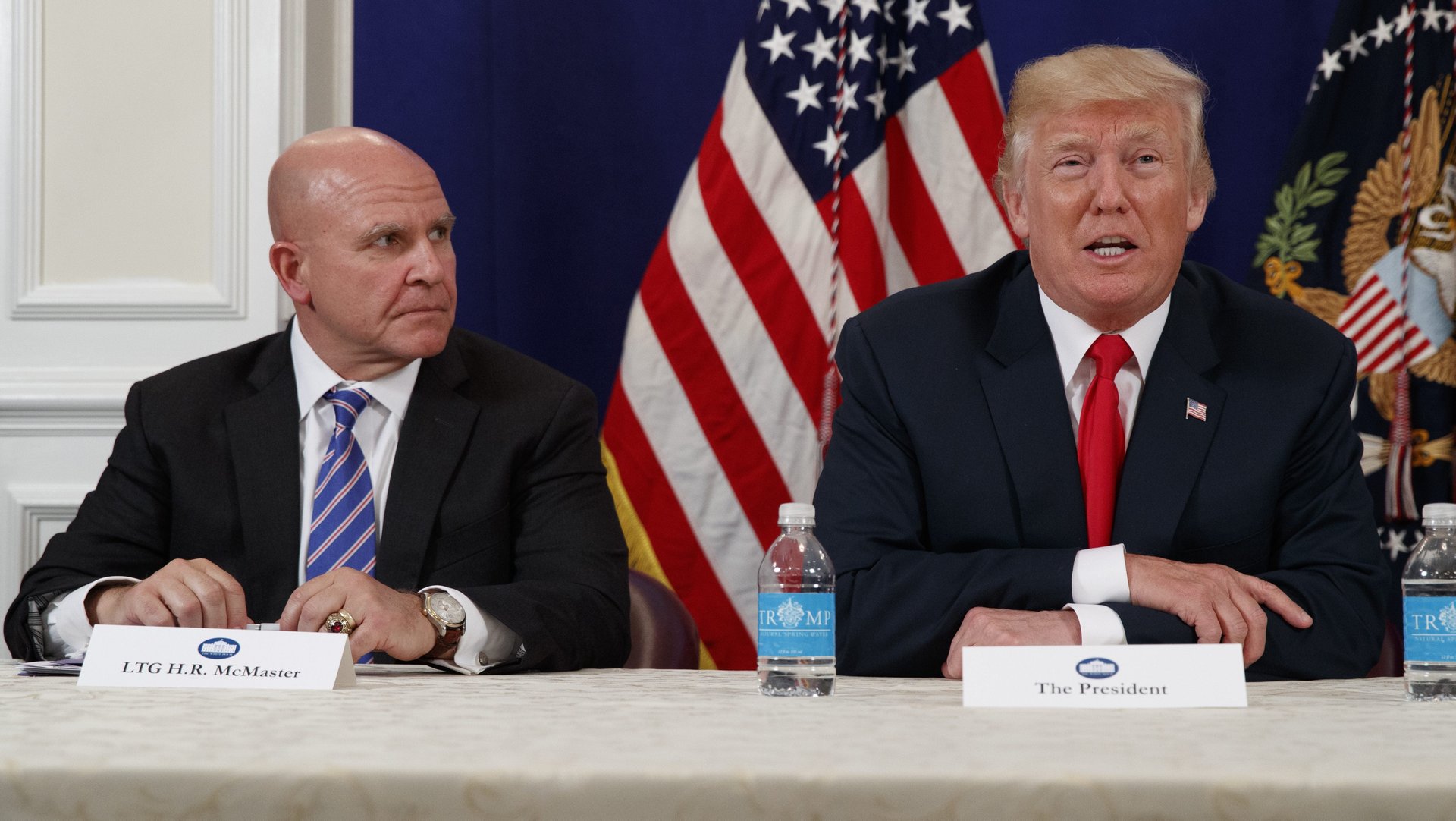Top figures in Trump’s White House are making war with North Korea sound inevitable
When US national security advisor HR McMaster spoke yesterday (Oct.19), press reports focused on his strained relationship with senator John McCain and details an attack in Niger that killed four US soldiers earlier this month.


When US national security advisor HR McMaster spoke yesterday (Oct.19), press reports focused on his strained relationship with senator John McCain and details an attack in Niger that killed four US soldiers earlier this month.
But far more consequential were McMaster’s vehement remarks on North Korea.
Asked at the Foundation for Defense and Democracy about Pyongyang’s decision not to negotiate with Washington until it has full nuclear capability, McMaster insisted that the peninsular had to denuclearize:
The president has been extremely clear on his perspective on North Korea. He’s not going to accept this regime threatening the United States with a nuclear weapon. He just won’t accept it. There are those who have said, ‘What about accept and deter?’ Well, accept and deter is unacceptable. So this puts us in a situation where we are in a race to resolve this, short of military action.
In addition to dismissing the strategy of deterring nuclear weapon use, McMaster similarly wrote off “freeze-for-freeze”—in which the US would stop military exercises near the peninsula, in exchange for Pyongyang pausing its missile program. Most experts see freeze-for-freeze as a viable diplomatic route to avoid conflict.
Richard Haass, the influential president of the Council on Foreign Relations think tank and onetime advisor to former secretary of state Colin Powell, tweeted in response:
The tone of impatience from McMaster—seen as one of the most rational actors in the administration—also has top analysts worried. McMaster echoed his boss Donald Trump by repeatedly saying “we’re running out of time” and bemoaning “long, drawn-out negotiations during which North Korea continues to advance their missile program.” He also seemed to talk down dealmaking as ineffectual:
“Long drawn-out negotiations…then deliver a nuclear agreement, and North Korea then immediately breaks that agreement. That agreement: what does it do? It locks in the status quo as the new normal—you can’t afford it any more. As [UN] Ambassador Haley said, ‘We’ve been kicking this can down the road and we’re out of road.’
The US won’t make progress toward denuclearization without patient diplomacy, says Joel S. Wit, who had senior roles in North Korea nuclear negotiations under president Bill Clinton. ”[McMaster] wants denuclearization, but the point is he wants it overnight somehow. It’s not magically going to happen overnight,” Wit said in a phone interview. “If not overnight, that means you need to negotiate, reach agreements, be in phases—and that takes time. It doesn’t sound like [the administration] is really interested in taking time.”
It seems McMaster’s strategy is either “laying the groundwork” for some kind of military action, an attempt to spook China into taking heavy economic sanctions, or both, says Wit, a senior fellow at Johns Hopkins and Columbia University.
Limited military action may include shooting a North Korean missile test out of the sky, he explains. “If we destroy it over the Pacific, [the White House] thinks ‘Oh gee, they’re not gonna respond because it’s off the Korean peninsula. But I think that’s an extremely dangerous kind of thinking,” Wit says. “We don’t really know what wouldn’t provoke a response. I think it’s more likely than not that there will be response from North Korea.”
Even the Trump White House seems far from a consensus on McMaster’s strategy. Defense secretary Jim Mattis’ views aren’t publicly clear, while secretary of state Rex Tillerson is bent on diplomacy—despite Trump undermining those efforts.